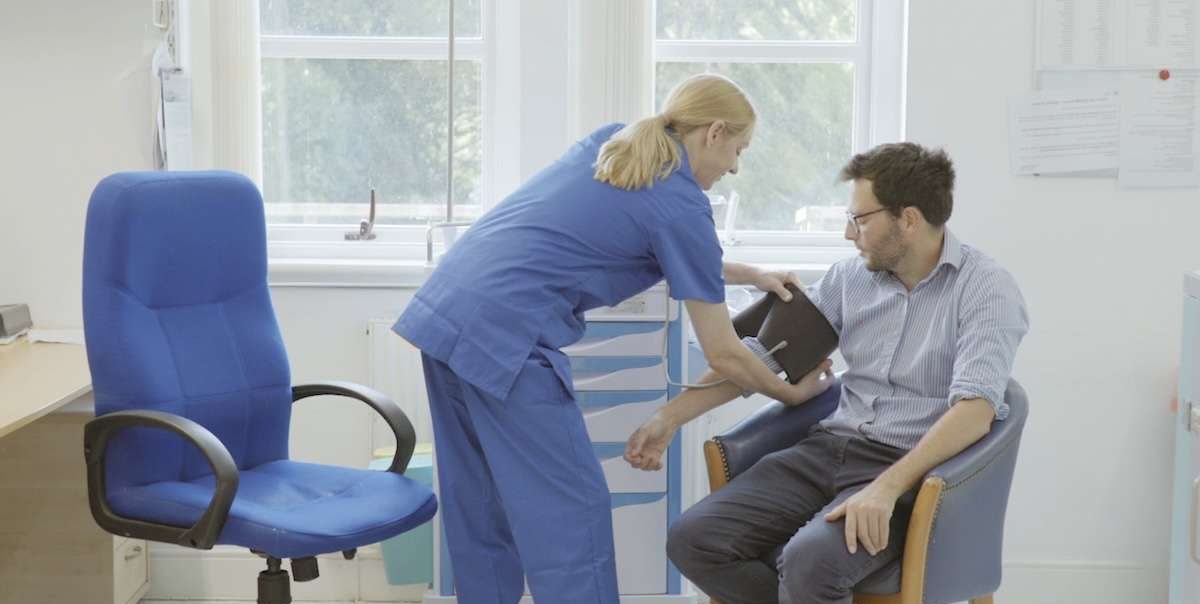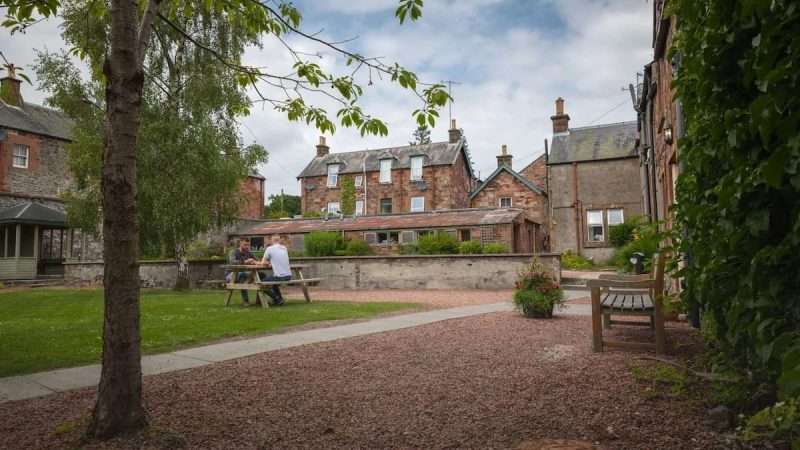
Medication Assisted Addiction Treatment
Castle Craig’s approach to drug and alcohol addiction treatment aligns with Scotland’s MAT standards, recognising that effective addiction treatment may involve different combinations of medical and therapeutic interventions. Our goal is to ensure each person receives the most appropriate care for their individual circumstances and recovery goals.
Castle Craig offers expert-led and compassionate medically managed detox in our peaceful and private residential setting, providing patients with a firm foundation for recovery. Situated within 50 acres of beautiful countryside, our therapeutic environment allows you to focus on your healing process in a calm and supportive atmosphere. We incorporate multiple addiction therapies that encourage mindfulness, physical fitness and an emphasis on nature to provide comprehensive, all-encompassing rehab treatment.
If you or someone you care about is ready to begin their recovery from drug or alcohol misuse, we invite you to reach out to our supportive team today by calling 01721 546 263.
What is Medication Assisted Treatment?
Medication assisted treatment (MAT) is a form of care that combines specific medications with counselling and therapy to address substance use disorders. These medications can help manage withdrawal symptoms, reduce cravings and support recovery efforts by stabilising brain chemistry. MAT may be used for conditions like opioid or alcohol dependency and should always be tailored to the patient’s needs, combining medical expertise with psychological support.
At Castle Craig we see MAT as one potential component of a wider recovery programme that also addresses the emotional, psychological and social aspects of addiction. While medication is most visible in the early stages, effective treatment also involves therapy, community support and long-term recovery planning. For some people, continuing medication during treatment may be appropriate, and we work collaboratively with each person to review their needs, personal goals, and clinical recommendations.
Our philosophy is that abstinence, paired with intensive therapeutic interventions, offers the best chance of lasting recovery. However, where clinically appropriate, MAT can play a supportive role within our abstinence-based programme, ensuring people remain safe and supported at every stage of their recovery journey.
Castle Craig’s Approach to MAT
Castle Craig’s approach to alcohol and drug rehab treatment aligns with Scotland’s medication-assisted treatment (MAT) standards, recognising that effective addiction treatment may involve different combinations of medical and therapeutic interventions. Alongside medical care and therapy, we work with referrers and partners to help address housing, benefits, and community support, ensuring that each person is linked into sustainable recovery networks such as recovery cafés and fellowship meetings. Our programme also includes harm reduction elements, such as advice on naloxone and safety planning.
We also recognise that some individuals may benefit from continuing opioid substitution therapy (OST) or other prescribed medications during their treatment. Our approach is to review this collaboratively, taking into account personal choice, clinical recommendations, and the reasons for referral. This ensures that people remain safe throughout their recovery journey, even if relapse occurs. Our goal is to ensure each person receives the most appropriate care for their individual circumstances and recovery goals.
MAT During Detox and Residential Rehab
Medication-assisted treatment can play a complementary role during the detox phase, offering medical support where necessary to manage withdrawal symptoms safely and effectively. For some patients, this provides stability in the early stages of recovery by combining medication with trained medical care, helping to minimise discomfort and reduce potential health risks associated with drug withdrawal. As both a hospital and a private rehab facility, our staff at Castle Craig are highly trained to provide safe, medically managed detox in our custom-built detox centre on site.
Following detoxification, our residential programme emphasises abstinence-based recovery through intensive therapy and support. For individuals who may benefit from continuing medication-assisted treatment, we integrate this medical support with our therapeutic interventions, always respecting individual choice and clinical recommendations.
After patients complete detox (should they require it), our UK-recognised addiction treatment shifts its focus to evidence-based therapies, helping you address any root causes of substance addiction and establish healthier coping mechanisms. By providing a comprehensive and person-centred approach, Castle Craig aims to empower patients to lead fulfilling, substance-free lives while significantly reducing the risk of relapse through proven and researched methods.
What is a Drug and Alcohol Detox Centre?
A drug and alcohol detox centre is a healthcare facility where patients undergo medically managed detoxification to handle withdrawal symptoms safely. If detox is recommended as the first stage of your recovery, it provides round-the-clock care for you, ensuring comfort and reducing health risks linked to ceasing drug or alcohol use.
Residential detox offers a controlled environment that prepares you for further substance addiction treatment. Staffed by medical experts and counsellors, it incorporates a blend of medication, supportive care and therapeutic practices to assist you or your loved one in transitioning to long-term recovery programmes.

Start Your Recovery at a Residential Rehab Today
Free Substance Addiction Assessment
Castle Craig offers free drug and alcohol addiction assessments at the start of our treatment process to support those seeking help. These assessments provide a confidential environment where you can discuss your challenges and receive expert guidance. Our aim is to help you better understand your situation and explore the treatment options that suit your needs.
Following your initial consultation, our team can develop a personalised residential treatment plan designed to help you on the path to recovery. With compassionate care and trained professionals, Castle Craig is here to support you every step of the way as you take this important step forward. Call 01721 546 263 today to schedule your assessment and start your journey.
Benefits of Medication Assisted Detox for Drug or Alcohol Addiction
If this approach is deemed safe and necessary by professional clinicians, medication assisted detox can offer benefits for those who are seeking recovery from drug or alcohol misuse. By integrating medical support with comprehensive care, rehabs that provide medication assisted detox can help address both physical and psychological aspects of substance addiction, offering a secure and manageable path through the challenges of withdrawal.
At Castle Craig, we understand that the idea of facing withdrawal symptoms may be uncomfortable and worrying. Our initial stage of treatment involves a detailed medical assessment to determine if medication is needed, and for those requiring it, a medically managed detox is provided with vigilant care and support from our expert health professionals. Our skilled medical and nursing specialists will be on hand to make sure your withdrawal symptoms are managed effectively to minimise your discomfort.
The following sections explore some of the key advantages of medication assisted detox, from reducing drug or alcohol cravings and supporting long-term recovery to helping you build a strong foundation for ongoing rehab treatment.
-
Safer Withdrawal Process
Undergoing withdrawal from drugs or alcohol can be physically challenging and, in some cases, dangerous. Medication assisted detox provides expert medical care to help manage withdrawal symptoms effectively. This reduces risks and makes the process safer, giving patients the reassurance they need to feel secure as they begin their recovery.
By carefully monitoring the body’s response, this approach can prevent or lessen health complications that can arise during detox. Whether it’s managing dehydration, seizures or other concerns, the emphasis is on patient safety and health throughout the detox process.o
-
Reduced Cravings and Relapse Risk
One significant benefit of medication assisted detox is its ability to help reduce cravings for substances. Medications can stabilise brain chemistry, making it easier for patients to focus on treatment without battling severe urges to use drugs or alcohol. By weakening the physical pull of substance dependence, medication assisted detox may help reduce cravings in early recovery and provide greater stability during the initial stages of treatment, lowering the likelihood of relapse. When used alongside therapy, this can support patients in staying engaged with the recovery process.
While these medications can play a vital role in promoting safety during the initial stages of recovery, they cannot address the underlying causes of alcohol and drug addiction or provide a long-term solution. Their use should be carefully limited to short-term support under professional guidance.p
-
Medically Managed and Controlled
Medication assisted detox involves expert medical management to provide structure and care throughout the detox process. Patients are under the watchful eye of trained professionals who can adjust treatment protocols where needed to meet their unique health requirements.
The trained clinical experience provided in private detox centres further ensures that any complications are addressed immediately, reducing uncertainties and promoting a structured path to recovery. The presence of an experienced care team is vitally important, and can make a huge difference to how comfortable you feel as you start your recovery journey.
-
Increased Comfort During Detox
Withdrawal from drugs or alcohol can be physically and emotionally demanding, but medication assisted detox can help to ease some discomfort. Specialised medications alleviate painful symptoms like nausea, insomnia or muscle cramps, making the experience more manageable.
With a focus on creating a supportive environment, this approach can also allow patients to begin their recovery with greater ease and confidence. Starting the process with less distress can have a profound impact on recovery outlooks.l
-
High Success Rates in Early Recovery
Some studies suggest that medication assisted detox may support improved completion rates in early recovery. Some patients are more likely to complete the detox phase when they receive the right medications and medical care to manage withdrawal symptoms effectively. Early recovery is a critical time in the healing process, and completing detox lays a solid foundation for participation in further therapy and treatment programmes.
However, completing detox does not mean that you have successfully recovered from drug or alcohol addiction. Committing to remaining abstinent requires a change of mindset that is nurtured by subsequent rehabilitation therapies and continuing care to address all aspects of substance misuse as a whole.e
-
Supports Long-Term Abstinence
For some patients, medication assisted detox may help ease the transition into abstinence by reducing early withdrawal symptoms and improving initial engagement with treatment. By addressing chemical imbalances and restoring a sense of stability early on, it can prepare patients for the emotional and psychological challenges of ongoing recovery.
When combined with continued therapy and lifestyle changes, medication assisted detox can be the first step on the road to long-term sobriety, helping patients maintain the progress they’ve made as they work toward a healthier future.
-
Reduces Mental Health Struggles
Substance misuse often goes hand in hand with mental health concerns like depression or anxiety with addiction. Medication assisted detox could help to mitigate these struggles by correcting imbalances caused by prolonged substance use and easing the emotional strain of withdrawal.
This integrated approach aims to promote well-being by addressing both addiction and its psychological effects. Patients can begin to rebuild their mental health as they move forward in recovery, undertaking addiction therapies or dual diagnosis treatment where needed.
-
Customised Treatment Plans
Castle Craig understands that every patient’s recovery needs are unique and personal, requiring tailored treatment plans and a holistic approach that respects and reflects this. Medication assisted detox could form the beginning of a patient’s overall treatment plan, and allow medical teams to evaluate health history and current conditions to develop further approaches that address their specific, individual challenges.
Our combination of medical attention and tailored planning provides care that aligns with your physical needs as well as your recovery goals. For over 35 years, we have been building a powerful framework for success that takes into account every aspect of recovery treatment as a whole.


Difference Between Inpatient Detox and Residential Medication Assisted Treatment
There is a slight technical distinction between inpatient medical detox and residential medication assisted treatment. Inpatient detox is typically conducted in a hospital-like setting, providing an intensive medical environment. Residential rehab treatment, on the other hand, happens in a rehab centre, offering a more relaxed and therapeutic atmosphere for recovery.
Despite these distinct settings, the terms inpatient rehabilitation and residential rehabilitation are often used interchangeably within addiction treatment discussions. Both focus on providing structured care, but their environments and approaches can vary depending on the specific needs of the patient.
As a trusted hospital and premium rehab centre, Castle Craig provides professional medically managed drug and alcohol residential detox in a therapeutic setting. Our peaceful, private environment allows patients to receive expert medical care and support in a warm environment as they begin their recovery journey.
Medication Assisted Detox Centre Near Me
Finding the right medication-assisted detox centre might seem like a challenging place to start, but it’s important to understand that medication might not always be necessary for detox. Speaking with clinical experts at an established, accredited rehab facility is the best way to assess your individual needs and determine the safest and most effective treatment plan to start your recovery. Whether you’re looking for expert care in a serene setting or a facility that offers tailored treatment plans, the next sections will guide you through some of your options for researching addiction treatment that feels right for you.

Contact Castle Craig Residential Detox Centre
Castle Craig is located in the tranquil area of West Linton, near Edinburgh in the UK. Our team of highly skilled medical professionals includes doctors, nurses and therapists with extensive experience in managing alcohol and drug dependency. We know that thinking about starting treatment, particularly medically managed detox, can feel frightening and overwhelming. This is why we are passionately dedicated to providing the utmost safety and most reliable support for you or your loved one at all times.
Find Us
01721 546 263
info@castlecraig.co.uk
Castle Craig,
West Linton, Edinburgh, United Kingdom, EH46 7DH
To learn more about our residential treatment for drug and alcohol addiction, we encourage you to call us on 01721 546 263. Our compassionate team is here to answer your questions and give you the clear and informed guidance you are searching for.
-
How to Find Private Medication Assisted Detox Treatment Near You
Medication may not always be necessary during detox; this is best determined by medical professionals during your admissions process. Finding a private treatment centre that will tailor your care to your requirements in this way is important, but doesn’t have to be overly complicated and stressful. Below are some ways to identify the most suitable facility for your needs.
- Search for Private Rehab Clinics: Start with location-specific searches to find clinics nearby. Queries like “Private rehab clinics in the United Kingdom,” “medication assisted treatment in Scotland,” or “detox centres near Edinburgh or Glasgow” can help you locate private rehab facilities near you that provide expert care.
- Contact a Private Addiction Specialist: Speaking with an addiction specialist can provide valuable advice on the services and treatment options available. They can help guide you toward the best approach for your recovery goals.
- Consider Private Health Insurance Coverage: Check whether your private health insurance covers private rehab treatment. Some policies may include coverage plans for medication assisted detox, which can ease the financial aspects of recovery.
- Ask About Residential Treatment Amenities: When assessing a residential addiction centre, enquire about its amenities. A comfortable setting with supportive staff can significantly enhance your overall recovery experience.
- Ask About Their Post-Detox Treatment Approach: For those who need it, detox is only the first step. Ask about the ongoing support and substance addiction therapy offered after detox to help you maintain long-term sobriety and overall well-being.
Find Out About Our Residential Detox Treatment
Castle Craig offers free residential addiction assessments during our admissions process, giving you a confidential and supportive opportunity to discuss your challenges and explore treatment options. Our team is dedicated to helping you find the right path toward recovery in a safe and welcoming environment.
After your assessment, we can create a tailored treatment plan to match your needs. You’ll also receive clear and accurate pricing for our residential rehab, helping you take the next step on your recovery journey with all the information you need. Call us today on 01721 546 263 to schedule an initial consultation with one of our professionals.
Free Addiction Assessment
Taking the first step and asking for help can feel daunting, but our team is here to assist you.
How Long Does Medication Assisted Alcohol Detox Take?
The duration of medication assisted alcohol addiction detox can vary greatly depending on several factors, such as the severity of addiction, personal health conditions and the presence of any underlying issues. These variables influence how long the detox process takes and the level of medical care required for a safe and effective recovery.
For mild to moderate alcohol dependence, medical detox typically lasts between 5 to 7 days. However, for severe cases, the process can take 7 to 10 days or even longer. If there are complications, co-existing health conditions or intense withdrawal symptoms, the timeframe may extend to accommodate the patient’s specific needs and medical care.
How Long Does Medication Assisted Drug Detox Take?
The duration of medication assisted drug addiction detox also depends on the severity of addiction, overall health and the specific substance being addressed—whether it’s heroin, cocaine, morphine or prescription painkillers. Each person’s experience will vary to meet their unique needs safely and effectively.
For short-term detox, the process typically lasts between 7 and 14 days. For those requiring long-term maintenance, detox may extend based on personal requirements and medical recommendations. If complications, health issues or severe withdrawal symptoms arise, the detox period could take longer to accommodate the necessary care and support.

Medications Used for Alcohol Detoxification
If required, the type of medication used during alcohol detoxification is determined by the severity of dependency, physical health, co-existing health conditions and whether the patient is also taking other medicines. Tailoring the detox process to these factors helps to provide the safest and most supportive care during recovery.
Below are examples of some medications that a rehab centre might use to assist with alcohol detox and recovery. However, the medications prescribed may differ based on your specific requirements, and a facility may also decide to use alternative options to guide you through this critical stage of treatment. At Castle Craig, we place the safety of our patients above all else. If medication isn’t necessary, we will always focus on what’s best for you, ensuring your recovery journey is guided by your individual needs and long-term health.
-
Chlordiazepoxide (Librium)
Chlordiazepoxide is a benzodiazepine commonly used during medication assisted alcohol detox to manage withdrawal symptoms. It helps reduce the anxiety, tremors and agitation that often accompany the process. This medication can be particularly useful in cases of moderate to severe alcohol addiction, providing a calming effect as the body adjusts to the absence of alcohol.
-
Diazepam (Valium)
Diazepam is another benzodiazepine addiction treatment medication widely prescribed for alcohol withdrawal symptoms. Known for its longer-lasting effects, Diazepam helps ease muscle spasms, reduce seizures and promote relaxation, creating a more manageable detox experience. Its ability to stabilise the nervous system makes it a helpful option for more severe withdrawal cases. Diazepam can be effective when managed carefully in a controlled detox setting, however it carries a high potential for dependence and misuse.
-
Acamprosate (Campral)
Acamprosate can play a part in helping to maintain long-term abstinence after the initial medication assisted detox phase. It may reduce post-acute withdrawal symptoms, such as irritability and cravings, by restoring chemical balance in the brain. Acamprosate is often used alongside addiction counselling and therapies to support ongoing recovery.
-
Disulfiram (Antabuse)
Disulfiram is unique in its role as a deterrent rather than a withdrawal aid. It works by creating unpleasant physical reactions, such as nausea and flushing, when alcohol is consumed. Disulfiram is sometimes used as a supportive aid to discourage alcohol use. It is most effective when combined with therapeutic interventions that address the psychological aspects of addiction. Disulfiram (Antabuse) should be regarded as a supportive aid rather than a standalone solution. For effective and lasting recovery, it should be paired with alcohol addiction therapies that focus on addressing the root causes of dependency. Antabuse must be prescribed with caution, particularly for patients with heart or liver conditions. Close medical supervision and ongoing monitoring are crucial to ensuring its safe use.
Medications Used for Drug Detoxification
The selection of medication for drug detoxification depends on various factors, including the type of substance used, the severity of the addiction and the presence of any co-existing health conditions. These elements are hugely significant in determining the most effective and safe treatment approach for each case.
Below are some examples of medications that might be used by a rehab centre to assist with drug detox and recovery. The choice of medication will vary depending on your specific needs, and it is possible that alternative medications or therapies may be prescribed to reflect your situation.
-
Methadone
Methadone addiction treatment is commonly used to help people detox from opioids such as heroin. It acts by stabilising brain chemistry and managing withdrawal symptoms without inducing the euphoric effects of the abused drug. Methadone may be used under close medical supervision to help manage cravings during opioid detoxification, and in some cases can support patients in stabilising their early recovery. Methadone has side effects including constipation, nausea, shallow breathing, chest pain and overdose risk.
Castle Craig’s rehab provides a comprehensive programme for methadone addiction treatment. This includes professional medical care and structured detox, followed by a customised psychotherapy plan tailored to each patient’s needs. Residential inpatient rehab is proven to be the most effective approach for treating methadone addiction, as it allows patients to manage physical cravings while benefiting from the encouragement and shared experiences found in group therapy sessions.
-
Buprenorphine (Subutex, Suboxone)
Buprenorphine is another FDA approved medication used in opioid addiction treatment. It binds to the same receptors in the brain as opioids but produces a milder effect, helping to alleviate cravings and withdrawal symptoms. Suboxone, which combines buprenorphine with naloxone, is designed to prevent misuse during treatment as the doses used are not sufficient to produce the euphoria or high obtained from opioid use.
-
Naltrexone
Naltrexone is used in the management of both opioid and alcohol dependence although it has limited efficacy. This medication works by blocking the effects of opioids, reducing the incentive to use them. When combined with therapy, Naltrexone can help to support long-term recovery efforts by addressing both physical and psychological aspects of drug addiction. Naltrexone can cause side effects such as nausea, headaches, anxiety and dizziness, which may deter some patients from continuing use.
-
Diazepam (Valium)
Diazepam can be particularly valuable in managing withdrawal symptoms from substances like benzodiazepines or alcohol. It reduces anxiety, muscle spasms and the risk of seizures during detox. In controlled clinical settings, Diazepam may be used to ease distressing withdrawal symptoms and help stabilise patients during detox. Diazepam can be effective when managed carefully in a controlled detox setting, however it carries a high potential for dependence and misuse.
-
Clonazepam
Clonazepam (Klonopin) is another calming medication used to ease withdrawal from benzodiazepines or certain drugs. It helps to stabilise brain activity, reducing the impact of withdrawal symptoms such as seizures, anxiety and insomnia. Its longer-lasting effects can make it an effective option for managing the challenges of detox. While effective in controlled medical settings, Clonazepam requires careful supervision to avoid dependency on clonazepam itself.
At Castle Craig, we approach the use of detox medications with the utmost care and responsibility to ensure they do not result in a new dependency. We appreciate that this may be a concern for some patients, and we are here to reassure you that medications are prescribed only when clinically necessary and are carefully managed under the close care of our Consultant Psychiatrist and experienced medical team.
Our goal is to alleviate withdrawal symptoms safely while focusing on your overall recovery and the goal of abstinence. By using evidence-based protocols and regularly assessing your progress, we only use detox medications as a short-term tool to support your transition into sobriety, always prioritising your long-term health, well-being and abstinence.

Contact Castle Craig Today
If you or a loved one is struggling with addiction, take the first step towards recovery by contacting Castle Craig. To speak with a member of our team, call us today on 01721 546 263. Alternatively, you can fill out our online form to get started. We are dedicated to helping you find the path to stable abstinence and a fulfilling, sober life.
Does Private Health Insurance Cover Medication Assisted Treatment?
Whether private health insurance covers medication assisted treatment will depend on your specific policy, coverage levels, and the insurance provider. It is essential to review your policy details or speak directly with your provider to confirm the extent of your coverage for rehabilitation services. You may need to prove eligibility for this kind of intensive treatment and gain approval from your insurer.
If you are covered and authorised for rehab treatment with us, Castle Craig accepts private health insurance from many major providers. The need for addiction rehabilitation can feel urgent, and we encourage you to call your insurer so that we can help guide you through our insurance admissions process quickly and efficiently. Fill out our online form if you need help on how to approach your insurance company, or for more information about our residential addiction treatment.
How Much Does Medication Assisted Detox Cost?
If medicated assisted detox is required, the cost in the UK typically ranges from £3,000 to £6,000 per month, depending on the programme. On a daily basis, you might expect to pay between £100 to £200 for independent treatment. However, medication assisted detox is not generally advised as a standalone treatment and is highly recommended to be part of a detailed rehabilitation programme lasting at least 28 days. This will provide you with comprehensive therapies to conquer drug or alcohol addiction from all angles, giving you all the tools needed for your recovery process.
Private rehab costs can vary based on your specific needs and the programme duration you initially choose. Additional factors such as the rehab centre’s location, amenities and the level of care can also influence the overall cost of medication assisted rehab treatment. Contact Castle Craig on 01721 546 263 for a breakdown of our residential rehabilitation costs and to discuss your therapy needs with us in more detail.
Questions About Medical Detox Treatment?
Contact us to discuss your treatment needs with a licensed clinician.
Medication Assisted Treatment Admissions Process
Even if you believe medication is necessary to help you abstain from drugs or alcohol, it may not always be the most suitable option. The admissions process at private rehab centres is designed to evaluate your needs and guide you toward the most effective treatment plan. Below is an outline of the typical steps involved in the process.
- Initial Enquiry and Confidential Assessment: Begin by contacting the admissions team for a private and confidential discussion about your situation. This step helps gather details about your health, substance use history and personal goals to determine the best course of action.
- Booking Admission and Arranging Payment: After the confidential assessment outcomes are reviewed by our clinical team, your admission can be booked. Payment arrangements are discussed during this stage, and guidance is provided to make the process as straightforward as possible.
- Arrival and In-Depth Medical Assessment: Upon arrival at the treatment centre, you will undergo a comprehensive medical assessment. This helps the team develop a more detailed and customised treatment plan while addressing any immediate needs.
- Medically Managed Detox and Medication Support: If required, the detox phase will begin under close medical management. Medications are administered to alleviate withdrawal symptoms, and the treatment team provides ongoing support to help you progress as comfortably as possible through this critical stage.

Contact Castle Craig Today
To learn more about Castle Craig’s residential treatment, admissions process or to book your free addiction assessment and start your journey, you can get in touch with us today. Our compassionate team is here to answer your questions and help you take the first step toward recovery with reassurance and care.
Call us at 01721 546 263 to speak with a member of our team. Alternatively, you can fill out our online form below for more information or to begin your admissions process. Your health will always be prioritised throughout your entire treatment, as well as your detox phase, so you can feel safe in taking the first step towards a healthier future with Castle Craig by your side.
Note: This page is for informational purposes only and does not constitute medical advice. Medications referenced must be used only when clinically indicated, and always under the supervision of qualified healthcare professionals. Castle Craig runs an abstinence-based addiction treatment programme. Medication-assisted treatment is not suitable for everyone, and the appropriate treatment will be determined during a medical assessment.
Free & Confidential Assessment
Compassionate, expertly delivered evidence-based practices and a patient-centred approach are at the heart of our treatment model. Request a call-back from one of our professionals on any day of the week.
-
Statistics on Medication Assisted Treatment in the UK
- NICE guidance demonstrates that combining medication with behavioural therapy in residential settings results in 70% better outcomes for long-term opioid recovery.
- Approximately 20,000 people in the UK successfully completed residential medication-assisted programmes annually, as highlighted by public health evaluations.
- UK-specific statistics in 2024 demonstrated that residential rehabs yielded a 90% detox completion rate, particularly for those following medication-assisted treatments.
- 30,084 people in Scotland were prescribed opioid substitution therapy in the 12 months ending December 2023.
- NICE studies indicate that medication support in well-structured residential environments reduces public health costs by £3.4 billion annually, reflecting the societal value of such programmes.